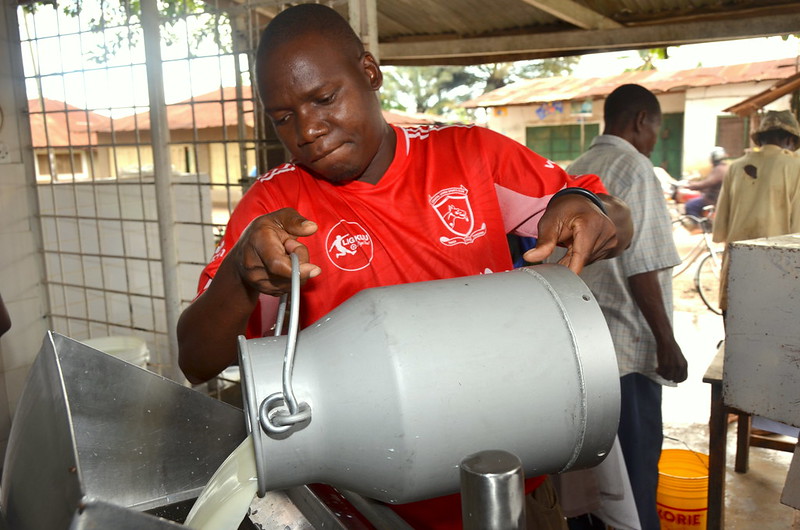Can livestock development be ethical and sustainable? A student looks for the facts
This is one of a series of blogs written by our Youth in Data delegates who participated in the 2020 CGIAR Convention on Big Data in Agriculture. The global event was held virtually 19-23 October, 2020.
This article was originally published by the Livestock Data for Decisions (LD4D) Community of Practice.
MSc student Isac Omar navigates the livestock evidence landscape to answer thorny questions
Being raised in Scandinavia and studying in Britain, I often hear about the war between eating meat and going vegan. The ‘go vegan’ argument hinges on the reasoning that plant-based solutions can prevent global warming. This ‘silver bullet’ rationale suggests that if we all went vegan, there would be a 75% reduction in land-use while animal cruelty and methane emissions would massively decrease. As a young person seeking to understand how society can balance sustainability with the productivity required to feed a growing world population, I’ve been morally conflicted by the increasingly polarised debate on livestock production and efforts to develop the sector.
During my time in Africa, I was met with contrasting attitudes. Compared to my deep-rooted perception from suburban Oslo, livestock was inseparable from daily life on the continent. From coast to coast, shepherds and nomadic tribes are united in the high value they place on their livestock. In Northern Nigeria the Fulani proverb goes; ‘the world was created from a drop of milk’ while the Masai in East Africa claimed ‘a cow is as good as a man’. It is an unmistakable fragment of the livelihoods and cultural fabric. However, livestock keepers are challenged with climate shocks, emerging diseases, and inefficiency. I spent some time on my uncle’s homestead in Bagamoyo, Tanzania, where I witnessed the shortage of feed during dry-season, tickborne pests and inadequate veterinary practices. My uncle’s situation is similar to countless livestock-keepers on the continent. And yet livestock is so central to people’s income and to their country’s economy. Without being an educated animal scientist, I understood a change in production was indispensable.
At this year’s CGIAR Big Data Convention, I discovered the work of the Livestock Data for Decisions (LD4D) community, who are working to put data and evidence at the centre of livestock discussions. Their Livestock Fact Check series helps unpack and verify some of the most popular statements around livestock. An interactive visualisation provides clear data on livestock being tied to all parts of the 17 Sustainable Development Goals, even gender equality.
This evidence helped me understand that the idea of cutting livestock out of the equation is particularly ‘westernised’, and by neglecting its development we’ll fail to eradicate world poverty. And while over-intake of animal-based products could affect our wellbeing, it’s usually opposite in most low-income countries where underconsumption is a more prevalent. Two billion people still walk in ‘hidden hunger’. This phenomenon is not the scarcity of food, but lack of bio-nutrients and essential minerals. According to Anne Lartey, Director of Nutrition at FAO, “hidden hunger can condemn a child to deep-rooted and irreversible harm. They would never be able to attain their intellectual, economic and development potential”. These disregarded diet-related matters arise with chronic diseases that stunt the development of populations in large proportions. Guaranteeing accesses to animal-sourced produce is an effective instrument to ensure dietary improvements in low-and middle-income countries, either by livestock they raise or the revenue they earn from them.
While there is consensus on livestock production contributing 14.5 percent of human-induced GHG emissions, these emissions vary wildly by region, the type of animal, and how it is reared. There is good potential to considerably reduce emissions and develop mitigation strategies through existing technologies and practices. The LD4D community works on developing strategic relationships and data-driven solutions that address the sector’s diversity and intricate dimensions. Productive animals can not only reduce emissions but lift smallholders out of destitute and improve food security in marginalised communities. However, reliable data is required to streamline strategies and ventures that uphold sustainable development of the livestock industry.
Being challenged by ethical narratives myself, I wonder to what extent the public debate on livestock production challenges the livestock development efforts. Speaking on behalf of the LD4D community, Vanessa Meadu (Communications and Knowledge Exchange Specialist at SEBI-Livestock) acknowledged it is a concern. The livestock sector only receives 2.5% of official development assistance, even though the development of livestock has enabled hundreds of millions of families in lower-income countries with basic livelihoods, incomes, food and nutrition. The need for animal-based products is expected to twofold in the approaching 40 years. This offers gigantic prospects beyond a billion people who depend on the livestock sector for their earnings. Particularly smallholders. Besides livestock keeping, there has been expressed tremendous potential for youth engagement and growth in the entire value chain from on-farm work to the retail of animal source food.
Being part of a generation left with exhausted ecosystems, rising inequality and alarming hunger, the urgency for collective responsibility is acute. Bill Gates once said “If you care about the poor, you should care about agriculture. And if you care about agriculture, you should care about livestock”. We need to reduce the climate and ecological footprint of livestock production while ensuring that people get the nutrition and income they need. As a young person who aspires to work in development, I’ve been compelled to embrace livestock’s complex narratives and understand its central contribution to sustainable development. Democratised data not only equips me with sobering evidence and better investment resolutions, but also serves as an ethical compass extinguishing detrimental approaches from more sustainable ones.
Isac Omar is pursuing an MSc in Agriculture and Development at University of Reading. Isac is a Youth in Data delegate who participated in the 2020 CGIAR Convention on Big Data in Agriculture. The global event was held virtually 19-23 October, 2020.
January 11, 2021
Isac Omar
2020 Youth in Data Delegate
CGIAR Platform for Big Data in Agriculture
Latest news





